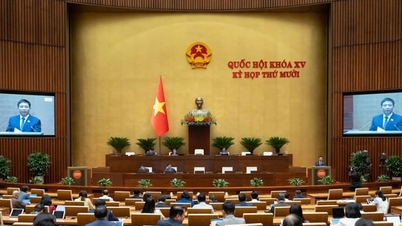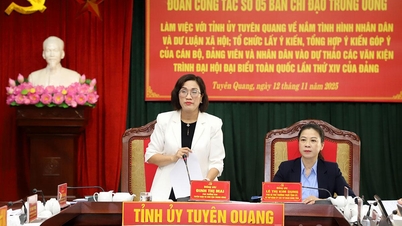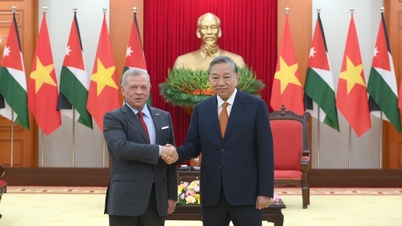Deputy Tran Khanh Thu ( Hung Yen ) pointed out the inadequacies and overlaps between the current Law on Prices and the Law on Medical Examination and Treatment, especially with public health services that are not on-demand services. Regarding the issue of technical standards, according to the Deputy, under current regulations, a service may have to submit for approval of technical economic standards and price approval twice, causing waste of time and difficulties for localities, especially when ministries and branches have not yet issued standards for more than 19,000 medical examination and treatment services.

Deputy Tran Khanh Thu pointed out that in reality, according to the Law on Medical Examination and Treatment, the Provincial People's Council regulates specific prices, but the current Price Law stipulates that pricing documents issued by state agencies are administrative documents, while documents issued by the Provincial People's Council are legal documents. According to the Deputy, this causes localities to submit to the People's Council to issue individual administrative documents for each unit, with thousands of services, leading to a waste of time and even failure. If health stations become public service units, they will have to prepare price plan documents and submit them to competent authorities according to full regulations.
From this reality, Deputy Tran Khanh Thu suggested that the drafting committee consider amending the pricing authority to unify with the price of medical services in general, adding medical examination and treatment services at public medical facilities to the adjustment appendix. Along with that, the authority should be assigned to the Ministry of Health to set the maximum price; and ministries, ministerial-level agencies, and provincial People's Committees should set specific prices according to each professional level; at the same time, add pricing regulations for emergency transportation services to unify price management nationwide, because this is a special service but there is currently no pricing guidance.

Delegate Pham Van Hoa (Dong Thap) is interested in regulations on price stabilization and the role of the State in pricing services. According to the Delegate, price stabilization in the market is very necessary and important, especially for essential goods, most of which are priced by the private sector based on raw materials and people's needs. Delegate Pham Van Hoa said that many goods have been subject to price stabilization in the past, but have not been "stabilized".
“The government has just announced a policy to raise wages, but the market is already showing signs of a 5-10% price increase. So what will be the solution to stabilize prices of items that fluctuate frequently? The draft law needs to have solutions for this,” Deputy Pham Van Hoa suggested.
The issue that Deputy Pham Van Hoa also expressed his concern and concern about is that the draft law assigns the commune level to coordinate with the province's functional agencies to carry out the task of price stabilization. "I do not understand when assigning the commune level to carry out price stabilization, what is being stabilized, while the specialized team at the commune level is very weak and lacking. Therefore, there needs to be clear regulations in this content to avoid difficulties in implementation," Deputy Pham Van Hoa expressed his opinion.

For categories priced by the State, Deputy Pham Van Hoa suggested that there should be a framework in pricing (maximum price, minimum price) to avoid group interests.
Deputy Thach Phuoc Binh (Vinh Long) commented that after nearly 1 year of implementing the 2023 Law on Prices, along with the issuance of guiding decrees and circulars, many provisions of the law have policy delays, lack flexibility in responding to price fluctuations, and are not really compatible with specialized laws such as the Competition Law, Pharmacy Law, Electricity Law, etc.
According to Deputy Thach Phuoc Binh, currently, the criteria for determining goods and services subject to State pricing are still qualitative, mainly based on the level of impact on socio-economic stability. This makes the inclusion or exclusion of an item from the list subject to State pricing unscientific and inconsistent.

From there, Deputy Thach Phuoc Binh proposed adding clear quantitative criteria and suggested a more flexible mechanism, allowing the Government to temporarily adjust the list of goods and services priced by the State for a maximum period of 6 months to stabilize the market.
Assessing that current price management depends heavily on the quality of information, but in reality, the price database between ministries, branches and localities is still scattered and has no standards, Deputy Thach Phuoc Binh proposed that there be clear regulations in the draft law amending the "national price database" that must be built according to open data standards and updated weekly.

Explaining and clarifying some issues of concern to the delegates, Minister of Finance Nguyen Van Thang pledged to absorb and review the principles and basis for valuation to ensure feasibility. The Ministry of Finance will study to concretize as much as possible the contents that can be included in the draft law, and arising issues and changes will be studied and specified in the guidelines.
Regarding the opinions of the National Assembly deputies regarding the "List of goods and services priced by the State", Minister of Finance Nguyen Van Thang said that the Ministry of Finance will continue to promote decentralization in pricing. Accordingly, ministries and branches will only set prices for centrally managed goods, while the rest will be decentralized to provincial People's Committees.
Source: https://www.sggp.org.vn/se-phan-cap-cho-dia-phuong-trong-dinh-gia-hang-hoa-dich-vu-post823085.html


![[Photo] Highways passing through Dong Nai](https://vphoto.vietnam.vn/thumb/1200x675/vietnam/resource/IMAGE/2025/11/12/1762940149627_ndo_br_1-resize-5756-jpg.webp)




































































































![Dong Nai OCOP transition: [Article 3] Linking tourism with OCOP product consumption](https://vphoto.vietnam.vn/thumb/402x226/vietnam/resource/IMAGE/2025/11/10/1762739199309_1324-2740-7_n-162543_981.jpeg)








Comment (0)